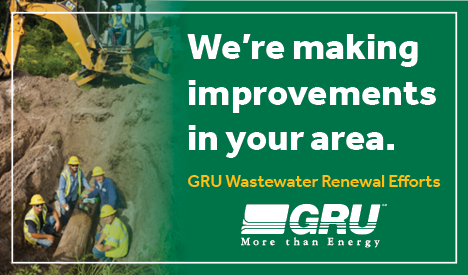GRU is Making Improvements in Your Area.
GRU is performing a large-scale, three-year assessment of our wastewater collection system. This assessment will allow us to develop a systematic plan of improvement projects that will efficiently and cost-effectively renew aging infrastructure. These projects will repair and replace important components of the collection system and reduce rainwater and groundwater (also known as inflow and infiltration) from entering into the system. This work is important to ensure the reliability and structural integrity of our wastewater system.

Wastewater Gravity
Main Lining (CIPP) Improvements
The preferred rehabilitation method to renew existing wastewater gravity pipes is called Cured-In-Place Pipe (CIPP). CIPP is a trenchless pipe repair technology that minimizes digging, which significantly reduces the time and disruption as compared to traditional rehabilitation methods. To avoid excavating, the CIPP technology uses existing manholes to access and renew the gravity mains. Typically, the only disruption to the public is traffic related, caused by accessing and staging equipment at these manholes.
While the work is being performed in your area, we ask that you limit your water use while the crew is working on the section of pipe that serves your residence. A section of pipe usually takes about 4 hours to renew/complete. The work is typically preformed Monday through Friday between the hours of 8:00 AM and 5:00 PM.
Approximately one week before starting the CIPP work, GRU will place yard signs along the roadway where the wastewater pipes will be renewed. The day before your section is renewed, a notice will be placed on your door describing the upcoming work and indicating a 4-hour timeframe that you should reduce your water use.
During this 4-hour window, your wastewater service connection will be temporarily sealed off while the pipe is being lined, but it will be reopened when the work is complete. Sealing the service will prevent any water leaving a home or building from entering the pipe and damaging the CIPP while it cures. During this time, large scale uses of water should be limited, such as:
- Washing clothes
- Washing dishes
- Using dishwashers
- Showering or bathing
Minimal use like washing your hands (please turn the water off while lathering/washing the hands) and flushing your toilet is acceptable. The contractor will notify you if there are any issues that cause the work to extend past the projected timeframe. Thank you for limiting your use during this time, failing to do so can cause a backup in your home.
To reduce the possibility of odors entering your residence or business, pour water into all of your sinks, showers, tubs and floor drains to make a water barrier in each drain’s “P-Trap”. This is also a good general practice to prevent unwanted sewer gases from entering a building or home, particularly for drains that aren’t used often. More details about P-Traps are provided in the Frequently Asked Question (FAQs) section below.
We thank you for your help during this process. We apologize for any inconvenience that this may cause to you and your family. Please do not hesitate to contact GRU if you have any questions or concerns.
An informational video showing the CIPP work is below: